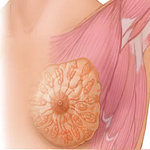Excessive Salivation in Pregnancy
Written by Dr.M.D.Mazumdar, MD
For many women, excessive salivation may be one of the first symptoms of pregnancy. In some, it can even occur before the first missed menstrual periods. Excessive salivation can start suddenly, about two or three weeks after conception. It usually decreases by the second trimester.

Excessive salivation is called 'Ptyalism' or 'Sialorrhea'. When it occurs during pregnancy, it is known as Ptyalism gravidarum.
It is more common in the first trimester and in women with Hyperemesis gravidarum - a condition in which there is severe nausea and vomiting.
Many women complain that it is one of the most uncomfortable feelings that they encounter during their pregnancy. They have their mouth full of spit at all times of the day. Spitting does not help as the mouth fills up almost at once. Some even say that they are afraid to speak, afraid that someone would say - 'Say it, don't spray it'.
A few women even complain that they drool at night, waking up in the morning with their cheeks and neck covered with spit.
A metallic taste sometimes accompanies the excessive salivation, spoiling their appetite.
Excessive salivation can be due to excess production of saliva or decreased swallowing of saliva.
Causes of Excessive Salivation
The exact cause is not known. But it is believed to be due to a combination of many different factors.
- Hormonal Surges: The high levels of progesterone and estrogen in the body during pregnancy stimulate the salivary glands leading to excessive salivation.
- Indigestion and Hyperacidity: Acid reflux can occur from the stomach into the esophagus during pregnancy. This can irritate the salivary glands causing more saliva secretion. The body also tends to produce more saliva in order to dilute the acid and reduce the heartburn. This cause is supported by the fact that woman with heartburn suffer from excessive salivation more than other women.
- Hyperemesis Gravidarum: Hyperemesis Gravidarum is a condition in which the pregnant woman suffers from severe nausea and vomiting, much more severe than the nausea and vomiting suffered during normal morning sickness. It may even necessitate hospitalization. The excessive nausea may prevent her from swallowing since swallowing causes more nausea.
- Irritants Irritants like smoke, tooth decay and other oral infections, certain medicines, exposure to toxins such as mercury and pesticides can also cause excessive salivation.
What you can do about Excessive Salivation
Excessive salivation continues for the first three months and clears up spontaneously at around the 14th week of pregnancy. In some women, it can continue till about the 20th week.

Read More:
Also Read-
- Infertility - some basic facts.
- Books on Menopause
- Signs of Endometriosis .
- Menstrual Periods - Some basic facts.
Do you have a gynecological or obstetrical problem? Would you like to discuss it in private? Consult our online gynecologist Dr.M.D.Mazumdar, MD (O&G), at any time you want and get your reply within 24 hours.We charge a nominal fee of USD 20 ($20) per question through Paypal.com.
The procedure of asking a question is quite simple. Clicking on the link below takes you to the Paypal website where the payment is made. After the payment goes through, you will be directed back to this website where you can ask your question. And rest assured, you will get your answer within 24 hours. And usually, even sooner.



